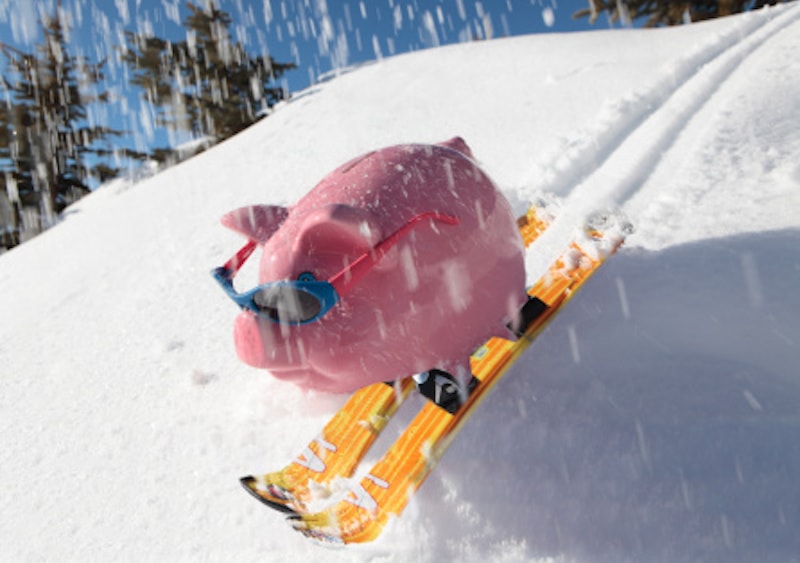An 11 to 13-week ski or snowboard instructor course can be one of the best experiences of your life, whether part of a gap year, a career break, or to get qualified for a new career.
However, despite the huge life and career advantages, coming up with over £7,000 for a course can seem difficult. And the cost is the point where many people hesitate:
This sounds incredible, ski 7 days a week for 11-13 weeks and get qualified to work globally, sign me up… wait HOW DO I PAY FOR THIS!???
So how do you afford a course like this?
Over the years people have joined our courses from all corners of the world, from a huge variety of backgrounds and financial positions. Some with family members with the means to pay on their behalf and others who manage with a little help.
However, an increasing number of our trainees have to pay for themselves. Often this is achieved through years of hard work, budgeting and saving but there are ways to make the payment more manageable:
How to afford a ski or snowboard instructor course summary:
1. Pay in interest-free instalments
2. Agree a flexible payment plan
3. Train for L1 & L2 qualifications in stages
Pay in interest-free instalments
Firstly, paying in instalments can make everything easier and more manageable but planning well in advance is needed to pay this way.
For many people, joining an instructor course is a lifelong dream, and planning in advance is natural. For others, it might be a spontaneous thing and there's not much time until the course starts.
But when it comes to the practicalities of paying thousands for an instructor course, planning in advance is what we always encourage.
If you choose to train with SnowSkool, full payment is not something that we require when booking a course - unless you book within 10 weeks of a course starting. And no interest is charged when paying in instalments!
So, we recommend booking a course 12 to 18 months ahead of time, if you can.
Agree a flexible payment plan
As well as paying in instalments, paying flexibly with a payment plan that’s tailored to an individual’s finances can make payments even easier to manage. For instance, you may have a lot of money available at some point in the future but not so much money until that point.
When you book your course with us, an instalment plan is discussed and drawn-up in the most manageable way. This plan will spread your costs out flexibly over the period of time between when you booked, and 10 weeks before the course kicks off (this is when payment in full is required).
Within reason, we aim to be as inclusive as possible for anyone around the world.
Train for Level 1 and Level 2 ski instructor course qualifications in stages
Our most popular courses are 11-13 weeks long - and provide globally-recognised Level 2 qualifications but they do cost the most.
If they are unaffordable for you, even over 12-18 months of paying in instalments, then a shorter course may be the answer because they are a lot cheaper than the long courses.
Our short courses (2 and 5 weeks) are designed for you to train for your Level 1 qualification only - whereas our long courses (11,12 and 13 weeks) are aimed at you achieving your Level 1 and Level 2 qualification.
Check out our short 2-week instructor course in the Three Valleys, France, in the links below: cost: £1,695
> Level 1 Snowboard instructor course
> Level 1 Ski instructor course
And check out our short 5-week instructor course in Big White, Canada, in the links below: cost: £4,550
> Level 1 Snowboard instructor course
> Level 1 Ski instructor course
So what's the difference? Level 1 qualifications primarily allow you to work as an instructor in the country where you qualify: BASI in the UK snow centres, CASI/CSIA in Canada and NZSIA/SBINZ in New Zealand etc. This is not always the case but a good guide to go on. Level 1 qualifications are also a bit more restrictive, and in some regions only permit you to work on dry slopes and indoors.
Level 2 qualifications, on the other hand, allow you to work internationally with very few restrictions and higher pay - with France being the exception (Skiers click here, and snowboarders click here to understand the requirements for becoming a ski or snowboard instructor in France).
So, a Level 1 qualification will not be as useful or attractive as a Level 2 qualification. However, starting by training for just a Level 1 qualification can be a stepping stone to becoming an internationally-qualified Level 2 instructor (and beyond) without committing the time and money for a longer course straight away.
If you’ve decided that ski instructing is the career for you but can’t quite afford a long course, then taking a short course can be a sensible first step. You can always come back and do the Level 2 later.
To understand how much salaries can differ with each level, check our guide on ski and snowboard instructor salaries.
Have any questions that are still unanswered?
Get in touch to discuss your course of choice in more detail and we can discuss how to make it realistic and affordable too - just start a live chat today if we're online!
